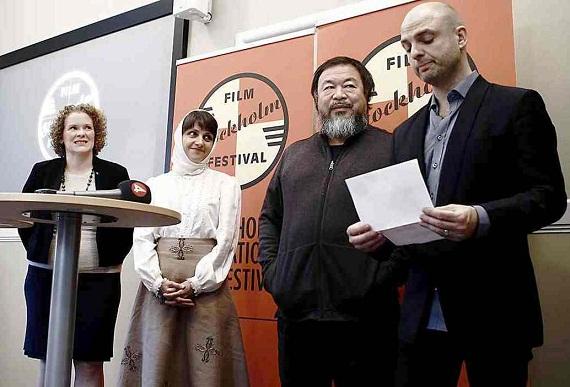HEADLINE
Asian films win top awards at Stockholm Int’l Film Festival
"The 26th annual Stockholm Int’l Film Festival had a few surprises in store this year. "

The 26th annual Stockholm Int’l Film Festival had a few surprises in store this year.
One was the attendance of artist Ai Wei Wei as a jury member for the Stockholm Impact Award.
That award was won by Leena Jadav from India. Chinese filmmaker Liang Zhao captivated audiences with his film Behemoth, which also grabbed the prize for best documentary film.
As Ric Wasserman reports, films from Asia are increasingly making their mark.
The camera pans across a barren, windswept landscape in Inner Mongolia. A valley quakes from explosions that rip apart the earth.
This is China’s new frontier, where mining for gas, coal and minerals is poisoning thousands of nomadic people.
Liang Zhao knows his film will never be shown on Chinese television. But the need to make it, he says, was overpowering.
“The first time I went to Mongolia the visual impact was very powerful. You see no green in the environment,” explains Zhao, “It’s like being on the moon – or Mars.”
It’s a hell on earth Liang Zhao shows us: grimy mine workers, the air thick with soot.
No one is interviewed in Liang Zhao’s film Behemoth. Instead Zhao skillfully weaves in passages from Dante’s poem, ‘The Diving Comedy’ from 1320 – a journey through hell, purgatory and heaven – a soul’s journey toward God.
The profits from the mining industry have been invested into building a gigantic housing complex in Inner Mongolia – but there are no residents. Only caretakers brushing sand from empty streets… An Absurdity.
But there’s nothing absurd about the slowly dying [do you mean slow dying of the workers?] of the mine workers Zhao has filmed.
“I know the Chinese people won’t see my film. My hope is that when the film is seen in festivals around the world it will remind us that Chinese products coming from the mines are killing its workers and their environment,” he says.
Liang Zhao’s film Behemoth won the Stockholm International Film Festival prize for best documentary.
Rubiayat Hossein is one of Bangladesh’s only women directors and has a new film at the festival titled: Under Construction.
It tells the story of Roya an actress, and her struggle against the suffocating conventions of society. Roya plays the part of Nandini from a traditional Tagore play, fighting to have her part rewritten in a modern context.
She couldn’t make it to the festival as planned, so I spoke with her from New York:
“Tagore, a male writer has created an archetype of femininity and women have to aspire to live according to that mold,” she says, “Nandini and Roya don’t want to do that. I made this film with all these characters and I just hope that Bangladeshi women in the audience will come to the theatre and see some self-reflection in these characters.”
The film will certainly have people talking when it’s released in Bangladesh. Hopefully it will stay in the theatres longer than Rubiayat Hossein’s first feature. Meheershan, which was pulled from Dhaka movie houses after one week and banned.
Rubiayat Hossein is optimistic though, about the state of the cinema in Bangladesh. It’s become less Bollywood-more reality.
“There is a real rise of middleclass filmmakers, urban filmmakers making more realistic films,” she says, “There are more multiplexes where these films are being released and a fair amount of support from the government. So infrastructure-wise I think Bangladesh cinema is taking a positive step forward.”
The highpoint of the Stockholm Int’l Film Festival was the announcement of the Impact Award, which confers one of the largest prize sums to a film’s director.
This year the winner was Leena Yadav for her film Parched. On hand, beamed jury member Ai We Wei, obviously relishing his newly won freedom to travel.
“I’m very happy to gain this freedom, after almost 5 years I couldn’t travel,” says Wei, “I’m very happy I could gain this freedom and this gives me a chance to come to cultural engagements like this one.”
Freedom, so important to artists like Ai Wei Wei is also the theme of Impact Award winner, Leena Yadav’s film Parched.
Beautifully shot by Titanic cinematographer Russell Carpenter, it’s set in a village in India’s Gujarat.
The film follows four women who fight to break away from male domination to live a life of their own choosing. They pay a price, but that’s necessary, says director Lenna Yadav:
“For me it’s about both the genders addressing the ideas that they bought into in terms of norm, or the cycle of life where we’ve bought into the same roles,” says Yadav, “It’s a breaking of that.”
But it’s not just women who are victims:
“To be honest I did not make this film from a point of view of women versus men. In those villages, for me, the men were just as much victims.,” she says, “And we’re always pointing out how the women need healing but I think that unless it is across board genders, there’s not going to be change.”
- eng
- Ric Wasserman
- Stockholm International Film Festival
- Asian Films
- Ai Wei Wei
Komentar (0)
KBR percaya pembaca situs ini adalah orang-orang yang cerdas dan terpelajar. Karena itu mari kita gunakan kata-kata yang santun di dalam kolom komentar ini. Kalimat yang sopan, menjauhi prasangka SARA (suku, agama, ras dan antargolongan), pasti akan lebih didengar. Yuk, kita praktikkan!